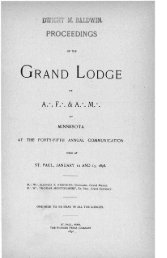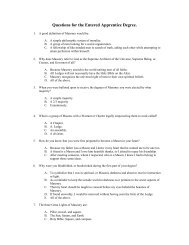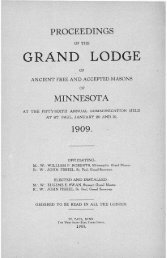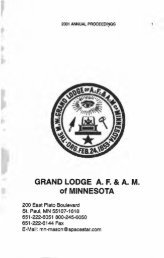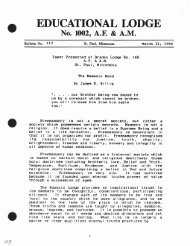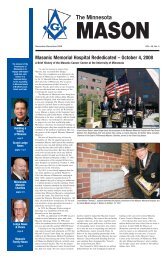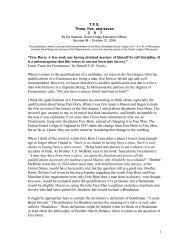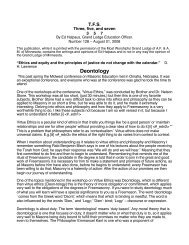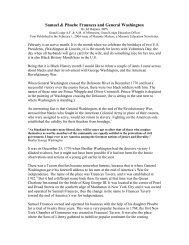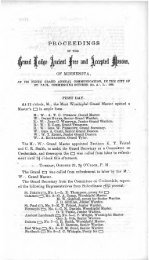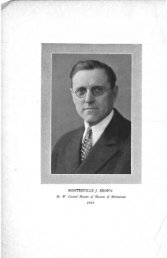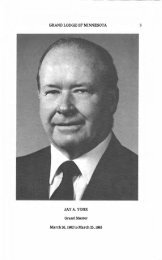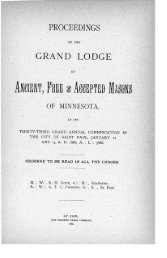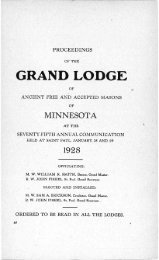dionysus cato and freemasonry - The Grand Lodge of Minnesota
dionysus cato and freemasonry - The Grand Lodge of Minnesota
dionysus cato and freemasonry - The Grand Lodge of Minnesota
You also want an ePaper? Increase the reach of your titles
YUMPU automatically turns print PDFs into web optimized ePapers that Google loves.
Educational <strong>Lodge</strong> N o . 1002<br />
A.F.& A.M. <strong>of</strong> <strong>Minnesota</strong><br />
Bulletin No. 126 St. Paul, <strong>Minnesota</strong> August 29, 2006<br />
DIONYSUS CATO AND FREEMASONRY<br />
Bro. Antonio Palomo-Lamarca, Royal Arch<br />
Ancient L<strong>and</strong>mark N°5, St. Paul-<strong>Minnesota</strong> (U.S)<br />
\t is my perception the Medieval<br />
times were the most interesting ones in the<br />
History <strong>of</strong> the Western civilization. In it we<br />
do find verses <strong>of</strong> antagonism <strong>and</strong> prose <strong>of</strong><br />
bigotry along the crucial lines <strong>of</strong> wisdom. It<br />
was times for imagination, for reason <strong>and</strong><br />
for faith. To define “medievalism” is to<br />
limit the cords <strong>of</strong> history with the fingers <strong>of</strong><br />
reckoning. Many scholars have already<br />
given out distinct dates in order to de-limit<br />
the historical period embraced as<br />
“medieval.” Yet, there is not a general<br />
consensus as to which dates must be more<br />
accurate than others. For the sake <strong>of</strong><br />
concision <strong>and</strong> pertinence, I shall use the<br />
generally accepted historical curve which<br />
goes from the year 500 AD up to the year<br />
1450 AD—even though some scholars cut<br />
<strong>of</strong>f the latter number to fifty years earlier.<br />
<strong>The</strong> collection <strong>of</strong> sayings I am about to<br />
discuss is generally supposed to have been<br />
rendered between the third <strong>and</strong> fourth<br />
century AD. Our Bro:. Benjamin Franklin<br />
published in 1735 in the city <strong>of</strong> Philadelphia<br />
an edition <strong>and</strong> translation <strong>of</strong> this very book,<br />
<strong>and</strong> he cherished it very much as a treasure<br />
<strong>of</strong> morality.<br />
<strong>The</strong> book I am about to comment on<br />
is entangled in-between these two dates, <strong>and</strong><br />
yet, there is not a significant <strong>and</strong> exact date<br />
as to which year it was actually written—let<br />
alone by whom. Commencing with a<br />
biographical tone, the author discloses his<br />
own identity as Dionysus Cato; immediately<br />
1 <strong>of</strong> 14<br />
Dionysus Cato <strong>and</strong> Freemasonry<br />
addressing his son <strong>and</strong> letting him know the<br />
appended sentences are for him <strong>and</strong> for his<br />
personal use in order to have a happy life.<br />
<strong>The</strong>se are moral sentences, saying which<br />
any man can read or peruse to enjoy a<br />
moment <strong>of</strong> tranquility <strong>and</strong> reflection. It is<br />
my inclination to believe that this collection<br />
<strong>of</strong> sayings, forming a complete book, would<br />
be <strong>of</strong> an enormous satisfaction <strong>and</strong> benefit to<br />
those who enter the Craft <strong>of</strong> Freemasonry as<br />
apprentices. It is the perfect study for the<br />
Mason who is willing to learn <strong>and</strong> sacrifice<br />
his prejudices to the Great Architect <strong>of</strong> the<br />
Universe or Great Mystery. I was told once<br />
that a Mason is a man who only has duties<br />
<strong>and</strong> no rights. I’ve hewn that in my heart.<br />
Freemasonry is a system <strong>of</strong> spirituality <strong>and</strong><br />
<strong>of</strong> ethics; this spiritual ladder—symbolized<br />
as the Jacob’s ladder—is composed with the<br />
rungs <strong>of</strong> ethics, where we do not sit to rest,<br />
but in which we do step in order to climb<br />
higher. <strong>The</strong> way each man construct the<br />
ladder is his own doing <strong>and</strong> responsibility,<br />
<strong>and</strong> the manner he decides to climb is part <strong>of</strong><br />
his self-education <strong>and</strong> existence. Religion<br />
forms just a very small part in this, <strong>and</strong> it is<br />
unlikely to be a rung at all. Religion <strong>and</strong><br />
spirituality are two separate <strong>and</strong> different<br />
things. <strong>The</strong> first is the mother <strong>of</strong> bigotry;<br />
the second the mother <strong>of</strong> eternity. For a true<br />
Mason the spiritual aspect is the only <strong>and</strong><br />
most important in our teachings <strong>and</strong><br />
symbols—that is why we do accept any<br />
person with any religious creed. Jacob’s<br />
ladder discloses the mystery <strong>of</strong> the<br />
apprentice just entered in the Temple <strong>of</strong>
Solomon; it is a ladder <strong>of</strong> the spirit that leads<br />
to the realm <strong>of</strong> the sempiternal gods.<br />
What can a bundle <strong>of</strong> sentences do<br />
for an initiated in Freemasonry? This is a<br />
very impertinent question, <strong>and</strong> I wonder<br />
about it because Philosophy <strong>and</strong> the<br />
philosophical quest are impertinent per se.<br />
It has already been said that doubt is the<br />
mother <strong>of</strong> wisdom, <strong>and</strong> to know is to<br />
question <strong>and</strong> wonder. No matter, our<br />
question being impertinent is legitimate.<br />
This book <strong>of</strong> sentences, <strong>of</strong> sayings, <strong>of</strong><br />
wisdom is intended to be a pool <strong>of</strong><br />
watery teachings for the initiate—<strong>and</strong> I say<br />
“watery teachings” because they can only be<br />
dried-up by the solar Wisdom <strong>of</strong> God. It can<br />
be useful to any pr<strong>of</strong>ane man or woman, but<br />
my interest at this very moment goes to<br />
Masonry. If the true Mason ought to be one<br />
walking on the spiritual ladder <strong>of</strong> Jacob <strong>and</strong><br />
stepping on its moral rungs, then, a book—a<br />
condensed one—which describes this trip<br />
into a common <strong>and</strong> easy-going language<br />
must be as precious as gold.<br />
2 <strong>of</strong> 14<br />
Dionysus Cato <strong>and</strong> Freemasonry<br />
I wish to do a brief commentary on<br />
those sentences which I believe more<br />
relevant to the Masonic wisdom <strong>and</strong> path; I<br />
have translated myself this book from the<br />
Latin into the English language keeping the<br />
original sense from the Latin. We deal here<br />
with a literal translation, <strong>and</strong> because I have<br />
scrupulously respected the virginity <strong>of</strong> the<br />
text, it might sound a little “disharmonious”<br />
to the lay reader not acquainted with the<br />
Classic languages or Classic English. If the<br />
author said something, I just translated<br />
directly what did he say respecting the<br />
originality <strong>of</strong> the sentence. <strong>The</strong> translated<br />
language sounds antique <strong>and</strong> out-<strong>of</strong>-style,<br />
yet it is not grammatically incorrect.<br />
Introduction to <strong>The</strong> Cato by Bro:. Franklin. Scanned<br />
from the original.
After explaining the reason <strong>and</strong> core<br />
<strong>of</strong> his writing in this little-book, the author<br />
divides it into two main sections: monostichs<br />
<strong>and</strong> distichs. It starts with short sentences,<br />
arranged in just one line, an old-style <strong>of</strong><br />
narrating called “monostich.” Indeed, next<br />
to it comes a series <strong>of</strong> sayings which are<br />
characterized by their being a “two-sided<br />
composite,” <strong>and</strong> this style was called<br />
“distich.”<br />
I.<br />
Starting with the monostichs, Cato<br />
begins with God, asking to his son to follow<br />
no lead <strong>of</strong> anyone <strong>and</strong> kneel to anyone<br />
except for God. <strong>The</strong> very first sentence,<br />
Deo suplica, talks about the power <strong>of</strong> God<br />
on everything on earth; it is a simple<br />
sentence with a simple meaning, the<br />
meaning <strong>of</strong> surrendering. To surrender<br />
himself to the Wisdom <strong>of</strong> God, to Its<br />
mysterious dictates, to Its eternal power.<br />
Some translators have literally murdered the<br />
whole text I have translated; they have put<br />
nouns where they are not, <strong>and</strong> invented<br />
adjectives where they are inexistent. In<br />
general, the Latin verb suplica, which is an<br />
imperative form, has been mistranslated as<br />
3 <strong>of</strong> 14<br />
Dionysus Cato <strong>and</strong> Freemasonry<br />
“pray,” giving a sense <strong>of</strong> “praying” to<br />
God—which will turn into “pray to God.”<br />
This is misleading <strong>and</strong> it does not maintain<br />
the virginity <strong>of</strong> the text. <strong>The</strong> main verb<br />
supplico means “to beg,” <strong>and</strong> it entails the<br />
act <strong>of</strong> “keeling-down.” Of course, this<br />
might be understood as an action towards<br />
prayer, <strong>and</strong> indeed, a prayer to God; yet,<br />
what would it be the sense <strong>of</strong> writing a<br />
sentence asking to somebody to pray to<br />
God? It must be already implicitly grasped<br />
that when one prays, he or she prays to<br />
God—regardless whoever decides to pray to<br />
some other entity. In fine, Cato is asking his<br />
son the following: if you are to beg or to ask<br />
for radical help, then you ought to keel<br />
down to God, do not beg to any mortal.<br />
<strong>The</strong> next sentence <strong>of</strong> importance for<br />
a Mason is—in my view—the one where<br />
Cato says “to be perseverant:” Diligentiam<br />
adhibe. I’ve translated this as “employ the<br />
perseverance,” <strong>and</strong> with this it must be<br />
understood that from all the usages we may<br />
employ in life the one regarding<br />
perseverance, firmness <strong>and</strong> hard-work is the<br />
most important. We Masons represent that<br />
with the symbol encompassed with a horde<br />
<strong>of</strong> bees working all-together around a<br />
beehive.<br />
Now then, the following sentence is<br />
the very kernel <strong>of</strong> the Masonic institution, its<br />
essence <strong>and</strong> its pride <strong>and</strong> foundation:<br />
Iusiur<strong>and</strong>um serua, “keep the oath.” Once a<br />
man establishes an oath <strong>and</strong> accepts it, he<br />
must live keeping that oath, <strong>and</strong> being<br />
mindful <strong>of</strong> why <strong>and</strong> how he did commit<br />
himself to such an enterprise. This should<br />
be an act <strong>of</strong> humility, <strong>and</strong> a remainder that<br />
our actions depend on our virtues, <strong>and</strong> that<br />
the Masonic oath is the binder which unites<br />
them. An oath must be stated with <strong>and</strong> from<br />
the heart, without extreme passions. It must<br />
be avoided the memory-work as the central<br />
part, since memory is a divine gift <strong>and</strong> it
always languishes in old age; yet, the spirit<br />
never decays, it is for ever <strong>and</strong> ever<br />
conscious <strong>of</strong> its doings <strong>and</strong> compromises.<br />
Freemasonry is a fraternity <strong>of</strong><br />
progress in the service <strong>of</strong> humankind, which<br />
is why she fosters research <strong>and</strong> tolerance. I<br />
have selected the following phrase as a tenet<br />
<strong>of</strong> this our philosophy <strong>of</strong> progress <strong>and</strong><br />
research: Bono benefacito. I decided to<br />
translated this one as “do service to the<br />
good,” which means that we must serve to<br />
those who need it, <strong>and</strong> these ones must be<br />
“good,” since we considered them<br />
meritorious <strong>of</strong> our service. In consequence,<br />
we should connect this sentence with the<br />
next one I’ve selected in order to complete<br />
its whole meaning: Aequum iudica, which<br />
is: “Judge equally.” When we do service to<br />
society or to any man or woman or<br />
organization, we must do it st<strong>and</strong>ing firm in<br />
an unbiased perspective, equally treating<br />
those who are in front <strong>of</strong> us. Equality is a<br />
Masonic virtue that must be cultivated on a<br />
daily basis. <strong>The</strong> highest Masonic motto—<br />
coming from the French Revolution—<br />
asseverates: Liberty, Equality <strong>and</strong><br />
Fraternity.<br />
In the next place we have: Patere<br />
legem, quam ipse teleris, that is to say: “to<br />
open to the precept that you yourself are<br />
stuck to.” This is another remainder <strong>of</strong> our<br />
oath as Masons, a remainder <strong>of</strong> fidelity,<br />
confidentiality <strong>and</strong> commitment. As the<br />
sentence declares, we ought to be “open” or<br />
“mindful” in our inner-space, in our heart, in<br />
our mind to that Law, that precept, that way<br />
<strong>of</strong> life we’re determined to stroll. <strong>The</strong><br />
precept can be seen under the above French<br />
<strong>and</strong> revolutionary motto: a way to freedom<br />
<strong>and</strong> tolerance.<br />
II.<br />
4 <strong>of</strong> 14<br />
Dionysus Cato <strong>and</strong> Freemasonry<br />
Among the distichs—the doubledsentences—I<br />
have picked up several <strong>of</strong> them<br />
which I, again, believe they reflect the<br />
Masonic philosophy best. <strong>The</strong> second part<br />
<strong>of</strong> the book, these distichs per se, is divided<br />
in four different sections or booklets<br />
wherein the ethical brush is once more<br />
applied on. Remarkably enough, the author<br />
starts again with God, fixing the tiny-puny<br />
border which divides the divine from the<br />
ethical. Another mistranslation has been<br />
given in this very first phrase, <strong>and</strong> it deals<br />
with the meaning <strong>of</strong> the word animus, which<br />
has been very badly rendered as “soul.” Let<br />
me explain animus is not soul, since there is<br />
another Latin word which defines her, <strong>and</strong><br />
this is: anima. <strong>The</strong> resemblance is amazing,<br />
<strong>and</strong> it has cost many mistranslations, not<br />
only in this book, but in many other ones.<br />
Animus means “mind,” “intellect,” the<br />
power which differentiates a human-being<br />
from an animal. This power is related with<br />
our discursive way <strong>of</strong> thinking, with our<br />
logic <strong>and</strong> reason. None the less, this power<br />
possesses a much higher state, a state <strong>of</strong><br />
consciousness—altered—wherein gods <strong>and</strong><br />
pure spirits live. This state <strong>of</strong> consciousness<br />
Plato deeply studied. Later on, the<br />
Neoplatonists called it “intellectual,” <strong>and</strong> it<br />
was that realm where a Superior Intellect<br />
existed. This Superior Intellect was God,<br />
<strong>and</strong> it itself was deemed to be Pure Intellect:<br />
Si Deus est animus, nobis ut carmina dicunt,<br />
Hic tibi Praecipue sit pura mente colendus.<br />
“If God is Intellect, such as the poems tell<br />
us,<br />
This one be to you especially with a pure<br />
mind cultivated.”<br />
Nothing is as precious to a Mason as<br />
his/her mind, by it he underst<strong>and</strong>s life <strong>and</strong><br />
interprets it; by the power <strong>and</strong> excellence <strong>of</strong>
the mind, the Freemason sees how to<br />
become more patient <strong>and</strong> less prejudiced,<br />
<strong>and</strong> it is thanks to the power <strong>of</strong> the mind that<br />
a Freemason betters him or herself. When<br />
we underst<strong>and</strong> the fact that God is a Pure<br />
Mind, perhaps gigantic or microscopic, or<br />
per chance infinite, then we are liable to<br />
better ourselves in the h<strong>and</strong>s <strong>of</strong> a Supra-<br />
Architect whose Eternal Might is directed to<br />
the pure spirit. Yet, now I did say “spirit”<br />
<strong>and</strong> not “mind,” <strong>and</strong> after all it is legitimate<br />
to wonder the whereabouts <strong>of</strong> the difference.<br />
Allow me to explicate <strong>and</strong> say the mind <strong>and</strong><br />
the spirit are two sides <strong>of</strong> the same coin.<br />
Mind <strong>and</strong> spirit are complementary to each<br />
other, like the two sides <strong>of</strong> our body <strong>and</strong> the<br />
two sides <strong>of</strong> our brain. To enter into<br />
philosophical disquisitions <strong>of</strong> this kind<br />
would take me hours—since this is the<br />
hottest topic in the philosophical pillars. A<br />
man can lose his mind <strong>and</strong> not his spirit—in<br />
fact, he can not lose it. <strong>The</strong> animal kingdom<br />
possesses mind <strong>and</strong> spirit, but their mind<br />
works in a different way than ours. <strong>The</strong><br />
ancients understood this fact compromising<br />
the human mind to be linked to the gift <strong>of</strong><br />
articulate-language. For the old Greeks a<br />
man is not a rational animal only, but an<br />
animal that can speak <strong>and</strong> think at the same<br />
time. It is through language that the mind<br />
becomes aware <strong>of</strong> herself, <strong>and</strong> it is through<br />
language that consciousness appears. <strong>The</strong><br />
ancient Greeks called this emphasis “logos,”<br />
which means “reason” <strong>and</strong> “speech”<br />
conjointly; the Latins translated it as<br />
“uerbum,” <strong>and</strong> this is the very word that is<br />
still used in our religious ceremonies<br />
without much underst<strong>and</strong>ing from those who<br />
listen. <strong>The</strong> apostle St. John starts his gospel<br />
with a simple dictum: <strong>The</strong> Word was in the<br />
beginning, <strong>and</strong> that very Word was with God<br />
<strong>and</strong> God was that Word. In the original<br />
Greek the word used is “logos,” which later<br />
on St. Jerome shall translate as “uerbum,”<br />
that is: word. This is not to say God is a<br />
“super-intelligent” creature, but just to<br />
5 <strong>of</strong> 14<br />
Dionysus Cato <strong>and</strong> Freemasonry<br />
underline the verity that God must be a pure<br />
spirit with the power to disclose Itself as<br />
pure mind <strong>and</strong> speech. This pure mind <strong>and</strong><br />
speech can only be grasped <strong>and</strong> understood<br />
by another pure mind, or by default it could<br />
only be glanced by cultivating a pure mind.<br />
To do this one has to get rid <strong>of</strong><br />
imperfections, <strong>and</strong> our Masonic teachings<br />
declare that in the very first degree, that <strong>of</strong><br />
apprentice, one must learn how to shape the<br />
rough ashlar, which is the analogue or<br />
metaphoric example to an impure mind.<br />
<strong>The</strong> perfect ashlar will be a perfect mind, a<br />
rock so steady <strong>and</strong> compact that no mishap<br />
can ever move or destroy. It is the first<br />
stone in the Temple <strong>of</strong> Solomon, the pride<br />
<strong>and</strong> joy <strong>of</strong> a Master Mason. Being this<br />
perfect ashlar the pure mind I am talking<br />
about, the next stage is to <strong>of</strong>fer it to the<br />
inhabitant <strong>of</strong> that Temple, <strong>and</strong> who else can<br />
it be but God? In this sense, no ceremonial<br />
<strong>of</strong>ferings are as important as the <strong>of</strong>fering <strong>of</strong><br />
our own perfections to God, <strong>and</strong> the shaping<br />
<strong>of</strong> our own imperfections in order to attain<br />
that state to which we all have been called<br />
for to fit in. That state is the level wherein a<br />
Master Mason is encrusted, <strong>and</strong> it represents<br />
the human perfection by means <strong>of</strong> good<br />
deeds, <strong>of</strong> tolerance, <strong>of</strong> love, <strong>of</strong> fraternity, <strong>of</strong><br />
humility. When the degree <strong>of</strong> Master Mason<br />
is conferred the recipient is entitle to strive<br />
for such perfection, <strong>and</strong> he or she knows that<br />
to know is to suffer <strong>and</strong> to suffer is to be<br />
purified. Nobody is a Master Mason except<br />
symbolically, but we have been beneficiaries<br />
<strong>of</strong> the gift <strong>of</strong> becoming; <strong>and</strong> by this, I mean<br />
that a man is always in a state <strong>of</strong> becoming,<br />
<strong>and</strong> a Mason is in the duty <strong>of</strong> becoming<br />
something better. Being mindful that our<br />
Mastery in Masonry is just symbolical<br />
permits us to foretaste the manna <strong>of</strong><br />
knowledge, <strong>of</strong> pure wisdom <strong>and</strong> <strong>of</strong> pure<br />
intellect; it is a remainder to tell us that there<br />
is a god inside <strong>of</strong> us. That one must be selfrespected<br />
<strong>and</strong> self-tilled with love, passion<br />
<strong>and</strong> underst<strong>and</strong>ing.
<strong>The</strong> next motto I desire to examine<br />
signs as follows:<br />
Infantem Nudum Cum Te Natura Crearit,<br />
Paupertatis Onus Patienter Ferre Memento.<br />
Whereas Nature created you a naked infant,<br />
Remember to bear patiently the burden <strong>of</strong><br />
poverty.<br />
We all love money: ones more than<br />
others. We all are attached to something:<br />
either material or spiritual. We all desire or<br />
long for. Desire is the skeleton <strong>of</strong> our<br />
imperfections.<br />
Matthias Grünewald (1475-1528): <strong>The</strong> Temptation <strong>of</strong><br />
Saint Anthony, (1515).<br />
<strong>The</strong> religious philosophy <strong>of</strong> Buddhism<br />
declares that wishing is the threshold <strong>of</strong><br />
suffering, since we strive to acquire things<br />
which are most likely impossible. In our<br />
medieval times the popular imagination<br />
6 <strong>of</strong> 14<br />
Dionysus Cato <strong>and</strong> Freemasonry<br />
encompassed this philosophy under the<br />
titled <strong>of</strong> “virtues <strong>and</strong> vices,” that, <strong>of</strong> course,<br />
it is full <strong>of</strong> Christian connotations. <strong>The</strong>se<br />
virtues <strong>and</strong> these vices changed from time to<br />
time, <strong>and</strong> it was not the same during the<br />
Crusades period as it was during the early<br />
Medieval one: in the first, it was the ideal <strong>of</strong><br />
becoming either knight or a monk which<br />
enticed the qualities <strong>of</strong> virtue, whereas in the<br />
latter—which is the period that concerns to<br />
Cato—strives for showing “knowledge” or<br />
“wisdom” as the principal virtue. In this<br />
regard, the Christian ideal <strong>of</strong> becoming a<br />
hermit was the core <strong>of</strong> the zone. And this<br />
ideal virtue was mainly represented by St.<br />
Anthony <strong>and</strong> his temptations in the desert.<br />
St. Anthony represented the Christian ideal<br />
<strong>of</strong> humility. A hermit is to be poor <strong>and</strong> to<br />
enjoy life with a minimum <strong>of</strong> supplies. He<br />
is the adult image <strong>of</strong> an infant, naked <strong>and</strong><br />
devoid <strong>of</strong> help. Yet, his strength is primarily<br />
centered in his spirit which is to be focused<br />
on God. <strong>The</strong> embracement <strong>of</strong> poverty was<br />
already seen as a sign <strong>of</strong> humility—the same<br />
that a sage ought to possess. A Mason<br />
without humility is not a true Mason. <strong>The</strong><br />
apprenticeship degree teaches us <strong>and</strong>, at the<br />
same time, initiates us in the mystery <strong>of</strong><br />
humility. <strong>The</strong> c<strong>and</strong>idate is aware that he<br />
came naked to the world to depart—in the<br />
Third degree—naked as well. This<br />
nakedness is represented during the First<br />
degree with the left knee, left chest <strong>and</strong> arm<br />
devoid <strong>of</strong> any clothing, to materialize this<br />
fact the c<strong>and</strong>idate is bereft <strong>of</strong> “metal<br />
substances,” which represent the materiality<br />
<strong>of</strong> life, <strong>and</strong> so, he is conduced blindfolded in<br />
a long-life trip in search for knowledge.<br />
Ne Timeas Illam, Quae Uitae Est Ultima<br />
Finis:<br />
Qui Mortem Metuit, Quod Uiuit, Perdit Id<br />
Ipsum.<br />
Fear that not, which <strong>of</strong> life is the last limit:
Who at Death dismays, whilst he lives, he<br />
loses he himself.<br />
Fear is a very natural apprehension,<br />
it is chemical by nature <strong>and</strong> it depends on<br />
personality traits <strong>and</strong> hormones—that’s why<br />
many animals can literally smell fear. <strong>The</strong><br />
Freemason is not liberated from fear, he is<br />
mortal <strong>and</strong> surrounding that mortality is the<br />
state <strong>of</strong> fear among others. If the First<br />
degree stresses our naked condition in the<br />
Universe, the Third degree shows us with all<br />
its despondency the reality <strong>of</strong> betrayal <strong>and</strong><br />
death. <strong>The</strong> c<strong>and</strong>idate is taught to believe<br />
only in himself <strong>and</strong> in That Who is above<br />
him or her. His travels are not yet finished,<br />
<strong>and</strong> the search for knowledge is still a<br />
symbol which is yet to move toward. We<br />
entered into the Craft as a child <strong>and</strong> we are<br />
expected to end as a man. Once the<br />
c<strong>and</strong>idate is symbolically slain, not only is<br />
he buried, but his bones became putrid <strong>and</strong><br />
dry as the penance <strong>of</strong> Life itself. Hitherto,<br />
life is not concluded for him. In the degree<br />
we do see the magnificent King Solomon,<br />
seated in his throne dispatching justice. We<br />
are told he is the bodily manifestation <strong>of</strong><br />
Wisdom, <strong>and</strong> yet he represents also, <strong>and</strong><br />
particularly in this degree, the virtue <strong>of</strong><br />
Hope. Once the c<strong>and</strong>idate is lost <strong>and</strong> dead,<br />
Solomon portraits his own actions as the<br />
mirror <strong>of</strong> Hope, <strong>and</strong> it is by means <strong>of</strong> this<br />
hope how a second <strong>and</strong> primal mystery<br />
appears: I mean, the mystery <strong>of</strong> resurrection.<br />
Only through hope the c<strong>and</strong>idate shall be<br />
restored to life—<strong>and</strong> the justice that<br />
Solomon shared had nothing to do with it.<br />
Thus, the Third degree teaches us, as the<br />
maxim <strong>of</strong> Cato, to not fear Death <strong>and</strong> to<br />
keep steadfast in hoping. In the end, the<br />
essence <strong>of</strong> the Master Mason degree is like a<br />
tree, where the fruit is the Resurrection, <strong>and</strong><br />
the roots are Hope. Now then, what each<br />
person may or may not underst<strong>and</strong> by the<br />
term “resurrection,” I shan’t discuss in this<br />
paper, but it suffices to just say that the<br />
7 <strong>of</strong> 14<br />
Dionysus Cato <strong>and</strong> Freemasonry<br />
concept <strong>of</strong> resurrection is older than the<br />
birth <strong>of</strong> Christianity <strong>and</strong> it belonged to<br />
different cultures as well.<br />
<strong>The</strong> Freemason is wont <strong>of</strong><br />
knowledge, <strong>and</strong> in this path one might find<br />
things which are wanted <strong>and</strong> things which<br />
are not wanted at all—<strong>and</strong> yet we must take<br />
them as they come. <strong>The</strong> basis <strong>of</strong> success is<br />
coated by the basics <strong>of</strong> accepting things as<br />
they are <strong>and</strong>, on top <strong>of</strong> it, appreciating those<br />
that are considered just as “trifle ones” or<br />
even not magnificent. <strong>The</strong> following<br />
sentence expresses in the words <strong>of</strong> Cato<br />
what I am trying to convey:<br />
Ne dubita, Cum Magna Petes, Impendere<br />
Parua:<br />
His Etenim Rebus Coniungit Gratia Caros.<br />
Doubt not, when the magnificent you ask<br />
for, to devote to the trifle:<br />
In these indeed things the gratitude joins the<br />
expensive.<br />
Not only must the Mason be appreciative<br />
<strong>and</strong> grateful for everything, but also must be<br />
aware <strong>of</strong> his human-position <strong>and</strong> fragility.<br />
This position, here <strong>and</strong> now, determinates<br />
his existence <strong>and</strong> the way he relates to the<br />
world. Developing a consciousness <strong>of</strong><br />
appreciation for that which is just simple or<br />
small creates in us a sense <strong>of</strong> reality wherein<br />
a non-attachment to frivolities is<br />
interpolated. We only know <strong>and</strong> learn how<br />
to appreciate things once we have lost them,<br />
<strong>and</strong> then we are aware <strong>of</strong> the value they had.<br />
This is very simple to underst<strong>and</strong> if we<br />
thought on something we had <strong>and</strong> never<br />
appreciated <strong>and</strong> once it was gone we<br />
realized about its worth. In other words: we<br />
don’t estimate that the kidneys exist in us<br />
until they start hurting. <strong>The</strong> second degree,<br />
that <strong>of</strong> the Fellow-Craft, would be a perfect
example for this. <strong>The</strong> c<strong>and</strong>idate has done<br />
some progress, but he is unaware <strong>of</strong> this<br />
progress. He can only realize about it by<br />
thinking it lost. <strong>The</strong>re is a new search for<br />
knowledge inside <strong>of</strong> an old-one. A new start<br />
with an old ending. He must maintain the<br />
treasure <strong>of</strong> his own progress, <strong>and</strong> appreciate<br />
that the progress done little-by-little is as<br />
great as that produced by sages. It has been<br />
said that this degree is a degree dealing with<br />
plain-existence, with our lives, or else, with<br />
Life itself. It is a practical degree indeed.<br />
Luxuriam fugito, simul et uitare memento<br />
Crimen auaritiae; nam sunt contraria<br />
famae.<br />
Flee from luxury, <strong>and</strong> likewise remember to<br />
avoid<br />
<strong>The</strong> flaw <strong>of</strong> avarice; for they are contrary to<br />
notoriety.<br />
Nothing would be as reprim<strong>and</strong>ing<br />
as a Mason who being greedy <strong>and</strong> vain does<br />
not attend to his own consciousness. A<br />
clean consciousness mean a healthy body:<br />
mens sana in corpore sano—said the<br />
ancients. It is the fundamentals <strong>of</strong><br />
psychosomatic medicine, where everything<br />
that goes into the mind filters into the body.<br />
A Mason is constantly fighting his passions,<br />
<strong>and</strong> greed is not less. We are all greedy in<br />
our own <strong>and</strong> personal way; money <strong>and</strong><br />
possessions don’t buy enlightenment—<strong>and</strong><br />
every initiated must keep this as a main<br />
tenet. Avarice is a flaw indeed, not only<br />
contrary to fame or self-respect, but also evil<br />
in its own origin. <strong>The</strong> remainder <strong>of</strong> death,<br />
<strong>of</strong> our mortal condition is a good way to<br />
stop our greedy ways, since we can not take<br />
with us after death that which we<br />
accumulated in life. Naked we came <strong>and</strong><br />
naked we shall depart. With no possessions<br />
8 <strong>of</strong> 14<br />
Dionysus Cato <strong>and</strong> Freemasonry<br />
we showed-up <strong>and</strong> with no possessions shall<br />
we leave. Masonry does not teach to leave<br />
our belongings, but it does teach us not to be<br />
attached to them.<br />
As we can see Freemasonry is a<br />
temple built with moral <strong>and</strong> spiritual bricks;<br />
the Temple <strong>of</strong> Solomon represents this<br />
design, <strong>and</strong> we must not confuse it with a<br />
material composite but in its stead, it is a<br />
spiritual model where the two main<br />
columns: Jachin or the pillar to the South<br />
<strong>and</strong> Boaz or the pillar to the North mean the<br />
two realms: the material <strong>and</strong> the spiritual.<br />
Let’s recall that these pillars were cast out <strong>of</strong><br />
bronze <strong>and</strong> not gold—even the capitals were<br />
made <strong>of</strong> bronze as well. As the Roman god<br />
Janus, the two-fold god, the common-reality<br />
possesses two main aspects: the material <strong>and</strong><br />
the spiritual. Janus represented the month <strong>of</strong><br />
January, <strong>and</strong> he was a good who looked at<br />
the inside <strong>of</strong>d things <strong>and</strong> also at their aspect<br />
from without. Cato expresses this concept<br />
in this maxim:<br />
Quod sequitur specta quodque imminet ante<br />
uideto:<br />
Illum imitare deum, partem qui spectat<br />
utramque.<br />
What is followed, look; whatever<br />
approaches beforeh<strong>and</strong> watch-out:<br />
That god be emulated, who looks at each<br />
part.<br />
Janus was a complicated god, but he<br />
was indeed the chief <strong>of</strong> all temples, that is to<br />
say, he was the one who invented the<br />
concept <strong>of</strong> “temple.” He had two faces, one<br />
to look at the north <strong>of</strong> everything, <strong>and</strong> the<br />
other one to look at their south. He was the<br />
master <strong>of</strong> changes, <strong>and</strong> it was not because he<br />
changed but because he knew <strong>and</strong> perfectly<br />
understood the essence <strong>of</strong> changing in
Nature. At each temple, he was supposed to<br />
be the gate-keeper, <strong>and</strong> he was the guardian<br />
<strong>of</strong> the Gate to Knowledge—his name itself<br />
comes from the Latin word janua, that<br />
means “gate.” <strong>The</strong> month <strong>of</strong> January, which<br />
is the first month, is the “gate <strong>of</strong> the annual<br />
calendar.” In our Craft this god is<br />
represented by the Tyler, who watches over<br />
the lodge from the outside knowing the<br />
secrets from the inside. It would be nice to<br />
foresee what is going to happen, <strong>and</strong> it is<br />
said that only to God belongs this dangerous<br />
knowledge. It has also been said that the<br />
Devil knows <strong>of</strong> the past <strong>and</strong> <strong>of</strong> the present<br />
<strong>and</strong> yet, not <strong>of</strong> the things to come. A<br />
Freemason doesn’t expect to achieve a sort<br />
<strong>of</strong> “supra-wisdom” to know the future; but<br />
he does strive for establishing the<br />
foundations <strong>of</strong> secure knowledge, a<br />
knowledge that grants the skill <strong>of</strong> foreseeing<br />
things out <strong>of</strong> personal-experience. And that<br />
is exactly the meaning <strong>of</strong> the above<br />
sentence: to witness reality <strong>and</strong> learn from it.<br />
Sermones bl<strong>and</strong>os blaesosque cauere<br />
memento:<br />
Simplicitas ueri forma est, laus ficta<br />
loquentis.<br />
<strong>The</strong> flattering <strong>and</strong> mellow speeches<br />
remember to beware <strong>of</strong>:<br />
Simplicity is the shape <strong>of</strong> the truth, the<br />
commendation <strong>of</strong> the talker a fiction.<br />
Nothing is more fictional than<br />
vanity—it feeds our imagination. A Mason<br />
must at all moment be mindful <strong>of</strong> life as a<br />
mirror <strong>of</strong> distorted reflections, where the<br />
true shapes or images are flawed by the<br />
convexity <strong>of</strong> egotism. As humans we are<br />
prone to internalize things through our mind<br />
<strong>and</strong> exteriorize them by means <strong>of</strong> language.<br />
Language is so a sword <strong>of</strong> Damocles<br />
9 <strong>of</strong> 14<br />
Dionysus Cato <strong>and</strong> Freemasonry<br />
hanging upon our heads, just waiting to<br />
attack or drop by itself. It is the most mortal<br />
weapon, since it carries the internal-force <strong>of</strong><br />
our sentiments <strong>and</strong> the external-remnant <strong>of</strong><br />
our ideologies. Mentioned firstly by the<br />
Roman orator <strong>and</strong> philosopher Cicero, the<br />
sword <strong>of</strong> Damocles is an ever-lasting curse;<br />
says Cicero that the old king <strong>of</strong> Syracuse,<br />
called Dionysius, <strong>and</strong> that lived in the fourth<br />
century before Christ, was a very rich man<br />
<strong>and</strong> had many flatterers at his court: one<br />
these flattering-fellows was Damocles.<br />
Being the king so tired <strong>of</strong> listening to his<br />
words, he asked Damocles back that if he<br />
loved so much his possessions <strong>and</strong> his<br />
power, why not he should check being a<br />
king for himself. Damocles was so eager<br />
<strong>and</strong> greedy that he assented to the royal<br />
dem<strong>and</strong>. Everything was fine except for the<br />
point where Damocles noticed a very long<br />
<strong>and</strong> sharpened sword hanging upon his own<br />
head. Obviously he was alarmed, but even<br />
more alarmed he became when noticed that<br />
the so-called sword was hanging suspended<br />
from the ceiling just with one hair <strong>of</strong> a<br />
horse. Damocles inquired as to why, <strong>and</strong> the<br />
king explained that that was how it felt like<br />
being a ruler: Damocles then, asked to be<br />
relieved from this duty <strong>and</strong> said: he rather<br />
preferred to be poor <strong>and</strong> safe than rich <strong>and</strong><br />
troubled. Language can be equaled<br />
with that sword, always hanging <strong>and</strong> always<br />
unsafe. Whatever we may say to-day could<br />
be used against us in the-morrow. Language<br />
is a lethal weapon, <strong>and</strong> that’s why they say<br />
God lives in silence.
Richard Westall (1765-1836): <strong>The</strong> Sword <strong>of</strong><br />
Damocles, (1812).<br />
Life is the greatest Miracle <strong>of</strong> all;<br />
Death: the greatest Mystery. <strong>The</strong> greatest<br />
mystery beyond our underst<strong>and</strong>ing. <strong>The</strong><br />
greatest test. We are mortals but magic<br />
beings, <strong>and</strong> it is our mission to ascertain<br />
such knowledge. Respect for our innerness<br />
is the perfect example for us <strong>and</strong> our fellowbeings.<br />
Innerness means the interior-space<br />
wherein the spiritual <strong>and</strong> the material quarrel<br />
their dues like two Titans in the dark-abyss<br />
<strong>of</strong> existence. This innerness ought not to be<br />
confused with “intimacy.” Intimacy is<br />
privacy; innerness is community. Being<br />
aware <strong>of</strong> our innerness is being aware <strong>of</strong> that<br />
which connects us with our fellow-beings—<br />
particularly with the human ones. This<br />
sense <strong>of</strong> togetherness must be essentially<br />
understood by a Mason, for it is that which<br />
makes us what we are with ourselves <strong>and</strong><br />
with others. It is only through pain or<br />
suffering how Man realizes about that<br />
important relationship between himself or<br />
herself <strong>and</strong> the others; the rhythm we put to<br />
our lives is most <strong>of</strong> the time drummed by<br />
our personal ideas, <strong>and</strong> half <strong>of</strong> that time we<br />
10 <strong>of</strong> 14<br />
Dionysus Cato <strong>and</strong> Freemasonry<br />
are pathetically wrong. Like a twig on a<br />
prairie we are stricken by the winds <strong>of</strong><br />
society <strong>and</strong> the storm <strong>of</strong> uncertainty. None<br />
the less, Nature is always bigger than society<br />
<strong>and</strong> came first too:<br />
Commoda naturae nullo tibi tempore derunt,<br />
Si contentus eo fueris quod postulat usus.<br />
<strong>The</strong> conveniences <strong>of</strong> Nature in no time to<br />
you lamented,<br />
If content with it you were ins<strong>of</strong>ar as the<br />
occasion requires.<br />
What is trying to convey here<br />
Dionysus Cato? I must say that sentence<br />
carries a heavy weight <strong>of</strong> Stoicism—a kind<br />
<strong>of</strong> philosophy very popular during the<br />
Roman Empire <strong>and</strong> during the next two<br />
centuries after the Fall <strong>of</strong> Rome. <strong>The</strong> stoic<br />
philosopher has to be tranquil <strong>and</strong><br />
straightforward. I personally believe there is<br />
a manifested influence <strong>of</strong> Stoicism within<br />
the Masonic ethics. Thus, we are before a<br />
relationship; a relationship <strong>of</strong> Man with<br />
himself from himself—<strong>and</strong> this relationship<br />
is born in society. Yet, society is just a<br />
bridle to the chaos <strong>of</strong> Nature. <strong>The</strong> Stoic<br />
philosophers know that, <strong>and</strong> the Mason<br />
learns from it as well. Nature is bigger than<br />
Man, <strong>and</strong> her pleasures <strong>and</strong> nuisances are<br />
just to us like the bridle to a horse. One<br />
must always be glad with the ways Nature<br />
expresses herself—even though most <strong>of</strong> the<br />
time we fail to underst<strong>and</strong>. Science strives<br />
for grasping the meaning <strong>of</strong> that Chaos; <strong>of</strong><br />
that manner which Nature foments<br />
producing endurance <strong>and</strong> patience. As Cato<br />
says, Nature does not weep for us; she is not<br />
lamenting our misunderst<strong>and</strong>ings <strong>and</strong> shortcomings—much<br />
less our naked<br />
helplessness. Being contented with her<br />
decisions is the beginning to underst<strong>and</strong>ing
the very kernel <strong>of</strong> the matter. We learn<br />
through pain <strong>and</strong> Nature makes sure we get<br />
it. Life is a test <strong>and</strong> Nature is the teacher.<br />
Our happiness depends on our<br />
underst<strong>and</strong>ing her, but this ought to be a<br />
deep underst<strong>and</strong>ing <strong>and</strong> not a superficial<br />
one.<br />
Res age quae prosunt; rursus uitare<br />
memento,<br />
In quibus error inest, nec spes est certa<br />
laboris.<br />
Practice the things that are useful; in turn<br />
remember to avoid,<br />
In whom error exists, no hope is certain <strong>of</strong><br />
the effort.<br />
Good learning comes only<br />
throughout good practice; <strong>and</strong> mastery<br />
comes by means <strong>of</strong> repetition. In this sense<br />
<strong>of</strong> repetition we must exert a passion for<br />
learning <strong>and</strong> participation in the process <strong>of</strong><br />
it; thus, <strong>and</strong> with it, comes the product <strong>of</strong> the<br />
effort, an effort which is labor or work.<br />
Obviously, there is no hope for those who<br />
wrongly toil in their lives. If learning means<br />
practicing, it must be practicing that which<br />
is good <strong>and</strong> pr<strong>of</strong>itable—practicing things or<br />
issues that are useful. <strong>The</strong> key to it is<br />
avoiding being attached to that which learn,<br />
<strong>and</strong> in a sense, becoming dependent on<br />
something which is immaterial to us.<br />
However, the most important part <strong>of</strong> it is not<br />
avoiding becoming dependant, but avoiding<br />
developing a sense <strong>of</strong> arrogance due to what<br />
we have learnt <strong>and</strong> mastered. If we fell into<br />
such a mistake, then, the effort we wielded<br />
is loosen.<br />
Now then, a Mason is not a Mason<br />
just because <strong>of</strong> the fact that he or she went<br />
through a series <strong>of</strong> initiation ceremonies—<br />
11 <strong>of</strong> 14<br />
Dionysus Cato <strong>and</strong> Freemasonry<br />
there is a much deeper realm to this. Neither<br />
a Mason is a Mason because he or she is<br />
able to memorize a sequence <strong>of</strong> words<br />
commonly called “memory work”—even an<br />
actor could do that <strong>and</strong> certainly he might<br />
not be a Mason. Parrots are capable <strong>of</strong><br />
memorizing <strong>and</strong> repeating <strong>and</strong> yet, they do<br />
not underst<strong>and</strong> that which they are<br />
echoing—on top <strong>of</strong> that they are not<br />
masons. Memory is a goddess, them,<br />
ancient Greeks, called her: Mnemosyne.<br />
Daughter to Uranus <strong>and</strong> Gaia, she had a<br />
special relationship with language—<br />
typically with that that was inspired by the<br />
Muses. <strong>The</strong> latter ones were in connection<br />
with the poets, but the primeval poets were,<br />
in fact, witches, medicine-men, priests, or<br />
shamans. <strong>The</strong>y had the ability to enter into<br />
an altered state <strong>of</strong> consciousness, by means<br />
<strong>of</strong> hallucinogenic plants, dances, or<br />
drumming, or fasting, <strong>and</strong> once in such state<br />
they talked to the spirits, to the gods, to<br />
angels <strong>and</strong> demons <strong>and</strong> from them they<br />
wrote down whatever the other told. This is<br />
how books like the Iliad, the Odyssey, some<br />
books <strong>of</strong> the Bible, the Koran, the Works<br />
<strong>and</strong> Days, etc, came into being. <strong>The</strong>se are<br />
named “inspired books,” because they were<br />
actually given by another’s voice <strong>and</strong> the<br />
writer was just the vehicle to deliver the<br />
message. Biblical inspiration is the closest<br />
to our culture—we were born in it. <strong>The</strong><br />
Bible calls—generally speaking—<br />
“prophets” to these poets, to these shamans<br />
or medicine-men. Some <strong>of</strong> them had also<br />
the power to heal, some others had just the<br />
power to enter into the so-called “altered<br />
state <strong>of</strong> consciousness” in order to deliver a<br />
communication. Indeed, prophecy was part<br />
<strong>of</strong> literature, in fact, it was the literature.<br />
Traditionally, medicine was also a part <strong>of</strong><br />
prophecy, <strong>and</strong> the very king Solomon—even<br />
though he was not considered to be a<br />
prophet—was supposed to have written<br />
some medical treatises which were given to<br />
him by inspiration. Also, Noah was
supposed to have medical knowledge given<br />
to him by inspiration—particularly by the<br />
angel Raziel. In all this the gift <strong>of</strong> memory<br />
plays part, <strong>and</strong> the power <strong>of</strong> learning <strong>of</strong><br />
born:<br />
Exerce studio quamuis perceperis artem:<br />
Ut cura ingenium, sic et manus adiuuat<br />
usum.<br />
Exercise in research regardless you grasped<br />
the art:<br />
Since with care the wit, <strong>and</strong> so the usage <strong>of</strong><br />
the h<strong>and</strong> helps.<br />
If memory helps to retain what we<br />
have learnt or processed, repetition <strong>of</strong> the art<br />
keeps it alive. Oft times, we need to study<br />
something whilst we don’t underst<strong>and</strong> very<br />
well the fundamentals <strong>of</strong> it; then, we get<br />
discouraged. However, persistence <strong>and</strong> wit<br />
is always with us as long as we are able <strong>and</strong><br />
willing to develop them. Memorization<br />
must appear naturally <strong>and</strong> never forced to<br />
happen. It must be just a product <strong>of</strong><br />
underst<strong>and</strong>ing <strong>and</strong> never <strong>of</strong> plain reiteration<br />
<strong>of</strong> words. One <strong>of</strong> the main pits into which<br />
the Freemason easily falls is repeating words<br />
without even underst<strong>and</strong>ing neither the<br />
meaning nor the essence <strong>of</strong> them—this is<br />
what I call the parrotization <strong>of</strong> Masonry.<br />
Memory is not memory unless it has a place<br />
in the underst<strong>and</strong>ing—otherwise it is just a<br />
robotic product <strong>of</strong> the mind.<br />
As a Mason you must be responsible,<br />
enthusiast within a limit, <strong>and</strong> full <strong>of</strong> energy<br />
always to help your fellow-humans. We<br />
must be observant <strong>of</strong> our environs, <strong>of</strong> what<br />
is going-on; striving to tolerate <strong>and</strong><br />
underst<strong>and</strong>. It is not—I must say—an easy<br />
task but it is, nevertheless, doable. <strong>The</strong><br />
philosopher Arthur Schopenhauer (1788-<br />
1860), who had a very strong influence from<br />
12 <strong>of</strong> 14<br />
Dionysus Cato <strong>and</strong> Freemasonry<br />
the Buddhist philosophy, thought that when<br />
we are feeling downcast it is always<br />
refreshing to reflect on those who have less<br />
than we have <strong>and</strong> on those who suffer more<br />
than we do. This is true <strong>and</strong> real; it is not a<br />
fiction. On a daily basis we can find people<br />
who are suffering more than ourselves;<br />
people who are in a deeper need than<br />
ourselves; <strong>and</strong> this is exactly what Cato<br />
conveys with the following dictum:<br />
Dum fortuna tibist rerum discrimine praua,<br />
Alterius specta cui sit discrimine peior.<br />
As long as fortune for you is <strong>of</strong> the things<br />
with distinction bad,<br />
Of other observe for whom it be with<br />
distinction worse.<br />
Another interesting fact that<br />
Freemasonry <strong>and</strong> Stoicism share is the sense<br />
<strong>of</strong> learning from Life itself, <strong>and</strong> particularly<br />
from each one’s lives. This is singled out by<br />
Cato in the following sentence:<br />
Cum tibi contigerit studio cognoscere multa,<br />
Fac discas, multa a uita te scire doceri.<br />
Whereas to yourself with study you had<br />
attained to know earnestly,<br />
Grant you learned, to know to be taught<br />
earnestly from your life.<br />
To do this self-examination a Mason<br />
must have firstly learnt to submit him or<br />
herself to the Superior Powers; in this<br />
personal travel to Enlightenment, we must<br />
accept the Superior Decisions <strong>and</strong> with it<br />
comes humility <strong>and</strong> acceptance. Once these<br />
are implemented, a self-analysis comes
parallel to our search. Let us not forget that<br />
Freemasonry is a spiritual system with a<br />
moral foundation, <strong>and</strong> that the true<br />
Freemason is that who continuously is in a<br />
pilgrimage to Knowledge. Yet, knowledge<br />
is pain, <strong>and</strong> one must be prepared to that<br />
which we are about to learn. Miverva was<br />
the goddess <strong>of</strong> wisdom for the old Romans,<br />
but also she was the goddess <strong>of</strong> warring.<br />
This was so because for the ancients to go to<br />
know was as going to battle: one never knew<br />
what was going to be found.<br />
Athene, otherwise Minerva. Roman National<br />
Museum 1 .<br />
Under this view, knowledge is as<br />
dangerous as war—<strong>and</strong> the peripheral<br />
effects are exactly like in war. A man in<br />
search for knowledge might feel<br />
psychosomatic sensations which are just a<br />
product <strong>of</strong> that war: the war <strong>of</strong> knowledge.<br />
Yet again, the ancient Greeks had an<br />
1 http://www.theoi.com/Gallery/S8.5.html.<br />
13 <strong>of</strong> 14<br />
Dionysus Cato <strong>and</strong> Freemasonry<br />
inscription hewn at the Temple <strong>of</strong> Apollo:<br />
γνώθι σεαυτόν, that is, “know thyself.” This<br />
temple was located in the city <strong>of</strong> Delphi, <strong>and</strong><br />
it was famous for giving away the most<br />
valued prophesies.<br />
To end, I partake <strong>of</strong> the wish that<br />
every Mason should always be just to<br />
himself <strong>and</strong> to those who are before him.<br />
For this task a long-life is spread ahead <strong>of</strong><br />
us, <strong>and</strong> with it, the heavy-weight <strong>of</strong> thinking<br />
that we are masters <strong>and</strong> lords <strong>of</strong> our own<br />
destiny. May burn our mouth when we<br />
blamed God for our own prejudices <strong>and</strong><br />
disgraces. May we not <strong>of</strong>fend that superb<br />
goddess whose blindness is a sign <strong>of</strong> justice:<br />
Fortune. She is capricious but certainly<br />
misunderstood. And yet, she is an<br />
everlasting remainder <strong>of</strong> our mortal<br />
condition <strong>and</strong> that everything in this earth is<br />
just fading-away. As Cato says:<br />
Fortunae donis semper par esse<br />
memento:<br />
Non opibus bona uita datur, sed moribus<br />
ipsis.<br />
Remember to be equal always with the<br />
presents <strong>of</strong> Fortune:<br />
Not by influences the good life is given,<br />
but by manners themselves.<br />
Officers Of <strong>The</strong> Educational <strong>Lodge</strong> No. 1002<br />
A.F. & A.M. <strong>of</strong> <strong>Minnesota</strong><br />
Master Bruce L. Sherman<br />
Senior Warden Richard Wallace<br />
Junior Warden John Besse<br />
Secretary Loren Davis<br />
Educational <strong>Lodge</strong> will publish papers which have<br />
been presented to the <strong>Lodge</strong> for discussion. Copies<br />
<strong>of</strong> these bulletins may be secured from the Secretary.
14 <strong>of</strong> 14<br />
Dionysus Cato <strong>and</strong> Freemasonry



